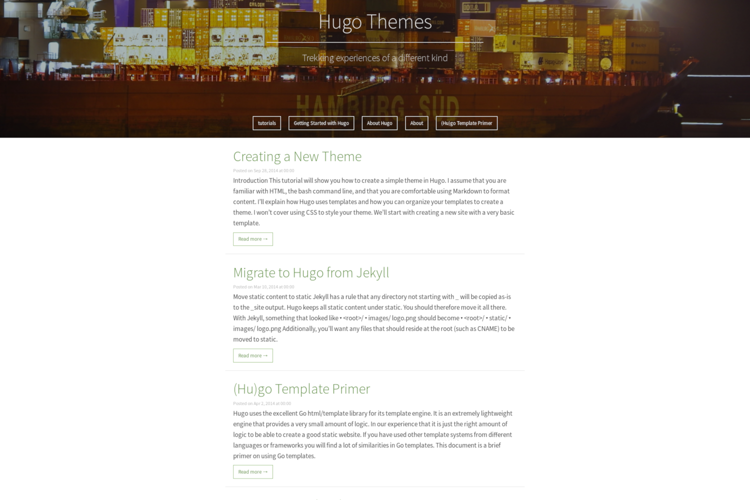Hugo Themes
hamburg
Simple and clean blog theme for hugo
- Author: Hauke Stieler
- Minimum Hugo Version: 0.62
- GitHub Stars: 13
- Updated: 2022-05-15
- License: MIT
- Tags: Blog Bootstrap Minimal Multilingual Responsive

Hamburg
Hamburg is a simple and clean blog theme for Hugo based on the vienna-theme from keichi.
Screenshots
Desktop

Mobile

Overview
Notable features I would tell somebody are:
- Consistent design
- Clean and flat design
- Easy to customize
- Responsive design (mobile friendly)
- Font Awesome icons
- Navigation
- Tags
- Menu
- Support for multiple authors
- Multilingual (in every way! Author information, menus, pages, posts, tags)
- Analytics with any JavaScript-Snipped based service (Google Analytics, Matomo/Piwik, …)
- Addional shortcodes
Installation
In your hugo site directory, run:
git clone https://github.com/hauke96/hugo-theme-hamburg.git themes/hamburg
The theme should now be in themes/hamburg/.
Configuration
You may specify following options in config.toml (or config.yaml/config.json) of your site to make use of this theme’s features:
baseurl = "http://your-site.com"
defaultContentLanguage = "en"
defaultContentLanguageInSubdir = "true"
title = "Your site title"
theme = "hamburg"
[params]
# Short subtitle/tagline. This is displayed in the header.
themecolor = "#hexcolor" # Defines the tab color in Chrome for Android.
# To load additional CSS styles
customCSS = ['hamburg.css']
# Show this very user-friendly and absolutely not annoying GDPR notice at the bottom of the page
ShowGDPRNotice = true
subtitle = "The great example site of the hugo-hamburg-theme"
# Since 0.57.0 there's the concept of "main sections". The files for the section "posts" are in "./content/posts/".
mainSections = ["posts"]
[languages]
[languages.en]
languageCode = "en"
languageName = "English"
subtitle = "A simple subtitle"
# Copyright notice. This is displayer in the footer.
copyright = "© some license"
[languages.en.menu]
[[languages.en.menu.main]]
name = "About"
identifier = "about"
url = "pages/about"
[languages.de]
languageCode = "de"
languageName = "Deutsch"
subtitle = "Ein einfacher Untertitel"
copyright = "© eine Lizenz"
[languages.de.menu]
[[languages.de.menu.main]]
name = "Über"
identifier = "about"
url = "pages/about"
Additional vienna-theme params
There’re some other params from the original vienna theme I’ve not used so far. Most of them might not work anymore, so there’s no guarantee:
[params]
# Social accounts. Link to these accounts are displayed in the header and
# footer.
twitter = "Your Twitter username"
github = "Your GitHub username"
gitlab = "Your GitLab username"
linkedin = "Your LinkedIn username"
googleplus = "Your Google+ user id"
facebook = "Your Facebook username"
reddit = "Your Reddit username"
hackernews = "Your Hacker News username"
stackoverflow = "Your Stackoverflow user id (number)"
keybase = "Your keybase.io username"
instagram = "Your Instagram username"
# Disqus shortname
disqus = "Your disqus shortname"
# Google Analytics API key.
ga_api_key = "Your Google Analytics tracking id"
# Mixpanel API key.
mixpanel_api_key = "Your Mixpanel API key"
Usage
Params of posts (front matter)
There’re some options you can set in the header of a post or page:
# The date will be at the bottom of the page at the "Posted on ..." label
date = "2018-08-13T15:38:27+02:00"
title = "Erster Eintrag"
draft = true
author = "hauke"
# The summary will be shown at the start page or other page/post lists
summary = "Dies ist nur ein Testbeitrag um die Website zu testen."
# This will ensure that the date is not printed
noshowdate = true
Shortcodes
There’re some simple shortcodes to make things easier.
Link to a tag
Creates a simple link to a tag page:
I like {{< linkTag veggy-food "yummi vegetarian food" >}}.
Include images
Includes images and opens them in a new tab when clicked:
{{< img "photo.png" "What a lovely picture" >}}
Get URL to an image
Creates a link to the given image
{{< imgUrl "photo.png" "link text" >}}
Embed scaled image
Scales an image to the given size and embeds it like the shortcode img does.
{{< imgUrl "photo.png" "What a lovely picture" "500x" >}}
(This image is scaled to 500 pixels in width, the height is determined automatically)
Multiple authors
This theme will read the information of an author based on the language code of a page.
To support multiple authors, create a data/<lang>/authors/name.toml file (so e.g. data/en/authors/hauke96.toml). This file contains information about the author:
name = "Your name"
avatar = "/images/avatar.jpg"
contact = "mailto:mail@foobar.com"
bio = "Something about you"
To support multiple languages, create multiple directories in the data directory. So for German as second language (languageCode would be de) the above example would also have a data/de/authors/hauke96.toml file.
Tracking
You can use the above configuration with e.g. Google Analytics or use your own JavaScript snippet to do so.
For a custom JavaScript snippet you have to create a layouts/partials/tracking.html file and put the necessary code into this file. The file (if it exists) will be embedded into the footer next to the other tracking mechanisms.
I tested this with the Matomo analytics software, which provides a JavaScript or image-based snipped that I put into the tracking.html.